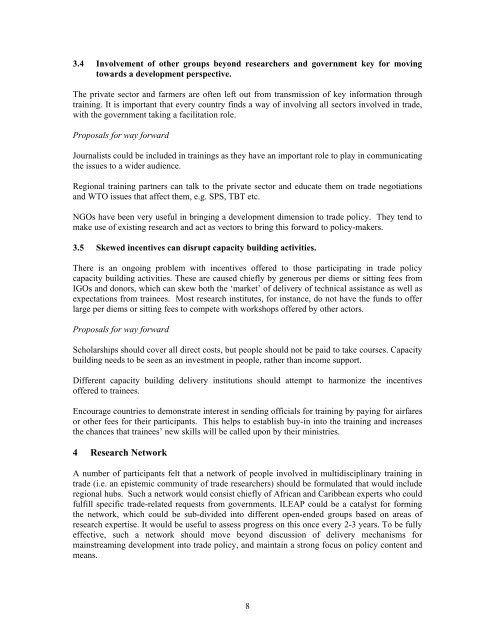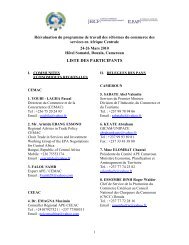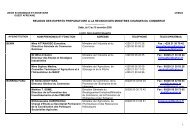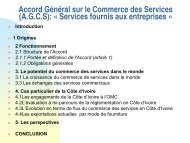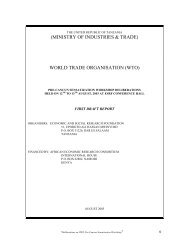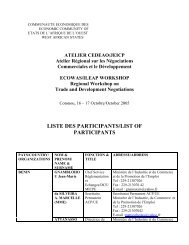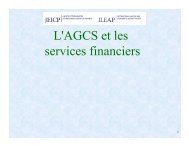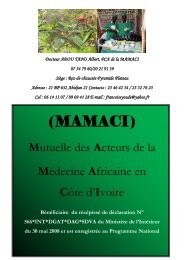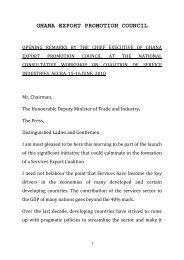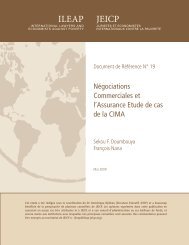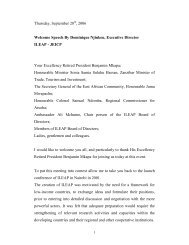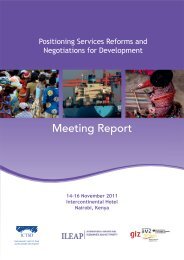Report of Proceedings - ILEAP
Report of Proceedings - ILEAP
Report of Proceedings - ILEAP
You also want an ePaper? Increase the reach of your titles
YUMPU automatically turns print PDFs into web optimized ePapers that Google loves.
3.4 Involvement <strong>of</strong> other groups beyond researchers and government key for movingtowards a development perspective.The private sector and farmers are <strong>of</strong>ten left out from transmission <strong>of</strong> key information throughtraining. It is important that every country finds a way <strong>of</strong> involving all sectors involved in trade,with the government taking a facilitation role.Proposals for way forwardJournalists could be included in trainings as they have an important role to play in communicatingthe issues to a wider audience.Regional training partners can talk to the private sector and educate them on trade negotiationsand WTO issues that affect them, e.g. SPS, TBT etc.NGOs have been very useful in bringing a development dimension to trade policy. They tend tomake use <strong>of</strong> existing research and act as vectors to bring this forward to policy-makers.3.5 Skewed incentives can disrupt capacity building activities.There is an ongoing problem with incentives <strong>of</strong>fered to those participating in trade policycapacity building activities. These are caused chiefly by generous per diems or sitting fees fromIGOs and donors, which can skew both the ‘market’ <strong>of</strong> delivery <strong>of</strong> technical assistance as well asexpectations from trainees. Most research institutes, for instance, do not have the funds to <strong>of</strong>ferlarge per diems or sitting fees to compete with workshops <strong>of</strong>fered by other actors.Proposals for way forwardScholarships should cover all direct costs, but people should not be paid to take courses. Capacitybuilding needs to be seen as an investment in people, rather than income support.Different capacity building delivery institutions should attempt to harmonize the incentives<strong>of</strong>fered to trainees.Encourage countries to demonstrate interest in sending <strong>of</strong>ficials for training by paying for airfaresor other fees for their participants. This helps to establish buy-in into the training and increasesthe chances that trainees’ new skills will be called upon by their ministries.4 Research NetworkA number <strong>of</strong> participants felt that a network <strong>of</strong> people involved in multidisciplinary training intrade (i.e. an epistemic community <strong>of</strong> trade researchers) should be formulated that would includeregional hubs. Such a network would consist chiefly <strong>of</strong> African and Caribbean experts who couldfulfill specific trade-related requests from governments. <strong>ILEAP</strong> could be a catalyst for formingthe network, which could be sub-divided into different open-ended groups based on areas <strong>of</strong>research expertise. It would be useful to assess progress on this once every 2-3 years. To be fullyeffective, such a network should move beyond discussion <strong>of</strong> delivery mechanisms formainstreaming development into trade policy, and maintain a strong focus on policy content andmeans.8


